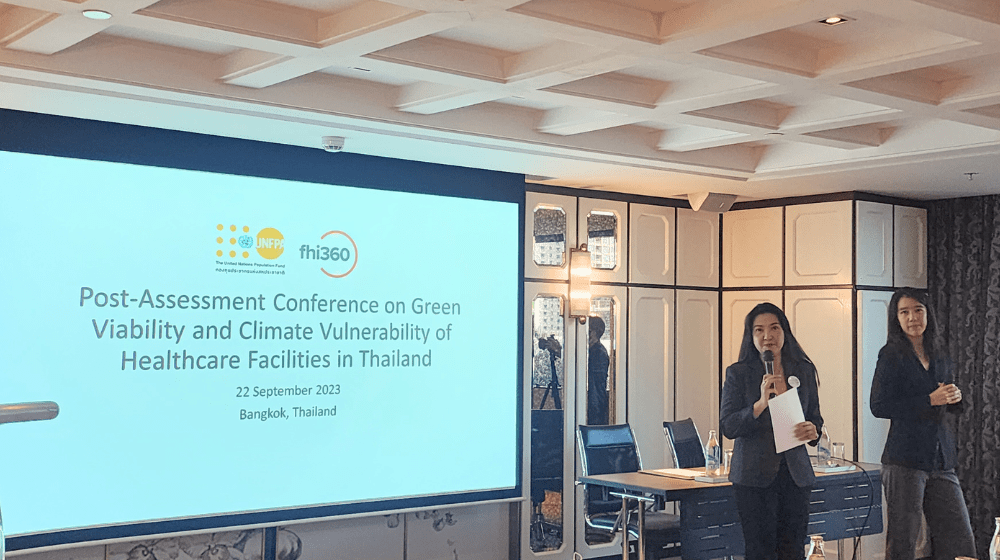Opening Speech by Dr. Asa Torkelsson, Country Director of UNFPA Thailand and Representative of UNFPA Malaysia
Bangkok, September 22, 2023 – United Nations Population Fund (UNFPA) and Family Health International (FHI 360) today released the results of the green viability and climate vulnerability assessments in select healthcare facilities in Thailand.
The healthcare facility assessments are an integral part of the unprecedented partnership between UNFPA and FHI 360 to advance the integration of climate-smart principles into the healthcare sector and foster sustainable and resilient healthcare systems that can effectively address the challenges posed by climate change in Thailand.
Worldwide, the health care sector is responsible for more than 4 percent of total greenhouse gas emissions, contributing to environmental degradation while climate-related events like floods, droughts, heavy storms, and air pollution disrupt access to health care services, threaten infrastructure, and pose physical and mental health problems. This wide-ranging impact of climate change on human health threatens to reverse decades of global development progress, especially among populations who are most vulnerable and least able to adapt to the changing environment. The World Health Organization (WHO) estimates that the cost of direct damage to health from climate change could reach up to $4 billion USD by 2030.
Focused on mitigating these issues, the assessments discern healthcare facilities’ potential climate risks and vulnerabilities and provide data and evidence to decision-makers for the development of tailored strategies, technologies, and policies to enhance the health sector’s climate resilience while ensuring the continued delivery of high-quality healthcare services.
“This strategic partnership between UNFPA Thailand and FHI360 marks a significant advancement. The assessment’s findings and recommendations will pave the way for us to provide greater support to Thailand in safeguarding community health, particularly for maternal health and gender-based violence survivors, amidst the challenges of a changing climate. This focus is vital, especially for vulnerable populations, particularly women and girls, who may bear a disproportionate burden due to climate change. The success of these assessments owes much to community engagement and contextual localization in Thailand. This model holds the potential for expansion to benefit broader Thai population and beyond”, announced Ms. Siriluck Chiengwong, Head of Office, UNFPA Thailand.
Dr. Amy Weissman, Deputy Regional Director, FHI 360 Asia Pacific Regional Office, highlighted the important aspect of this partnership: "We hope that this collaboration will serve as a model for climate smart healthcare initiatives that are tailored to addressing the unique needs and challenges faced by different segments of society, not only in Thailand but also globally. Climate-smart health care initiatives can help ensure the future of healthcare is both inclusive and environmentally friendly.”
This partnership, working at the intersection of public health and climate resilience, fosters innovative and sustainable solutions to enhance Thailand's capacity to address the dual challenges of climate change and healthcare delivery.
For media inquiries, please contact:
UNFPA Thailand: Ms. Kullwadee Sumalnop,
email: sumalnop@unfpa.org; Mobile, Line, Whatsapp: +66.81917.5602
FHI360: Ms. Ploy Udomsinka, Regional Communications Manager, Asia Pacific
Email: pudomsinka@fhi360.org
Background information
UNFPA
UNFPA is the United Nations sexual and reproductive health agency. Under the UN Country Team in Thailand, UNFPA’s cooperation with Thailand is in line with the United Nations Sustainable Development Cooperation Framework (UNSDCF) 2022-2026 , and the 13th National Economic and Social Development Plan (2023--2027) of Thailand and international normative standards, including the Convention on the Elimination of All Forms of Discrimination against Women and the International Conference on Population and Development (ICPD).
The country programme focuses on “leaving no one behind”, with three focuses as follows:
The platforms for adolescents and youth to acquire knowledge and skills on sexual and reproductive health and rights, focusing on family planning, and to participate in the implementation and monitoring of policies related to the Prevention and Solution of the Adolescent Pregnancy Problem Act, 2016 (AP Act) are functional and inclusive.
The strengthened policy implementation for the prevention of and response to gender-based violence.
The policy environment is strengthened through the utilization of evidence on population changes and megatrends, including population ageing and climate change, for
the development and monitoring of population policies and programmes.
The full Country Programme Document, please visit, here, or the factsheet of UNFPA in Thailand, here.
FHI360
FHI 360 is a global organization that mobilizes research, resources and relationships so people everywhere have access to the opportunities they need to lead full and healthy lives. With collaborations in over 60 countries, we work directly with local leaders to advance social and economic equity, improve health and well-being, respond to humanitarian crises and strengthen community resilience. We share data-driven insights and scalable tools that expand access and equity so communities can effectively address complex challenges, respond to shocks and achieve thriving futures. To learn more, visit fhi360.org.


